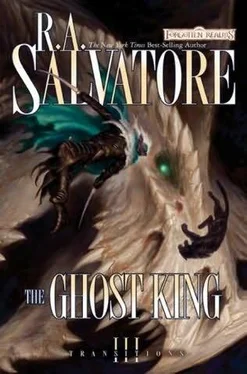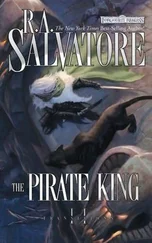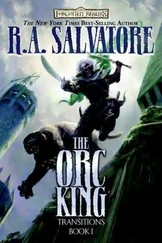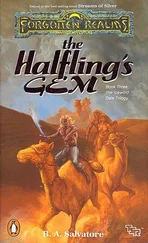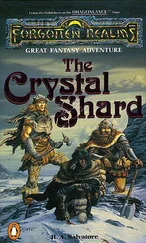Robert Salvatore - The Ghost King
Здесь есть возможность читать онлайн «Robert Salvatore - The Ghost King» весь текст электронной книги совершенно бесплатно (целиком полную версию без сокращений). В некоторых случаях можно слушать аудио, скачать через торрент в формате fb2 и присутствует краткое содержание. Год выпуска: 2009, Жанр: Фэнтези, на английском языке. Описание произведения, (предисловие) а так же отзывы посетителей доступны на портале библиотеки ЛибКат.
- Название:The Ghost King
- Автор:
- Жанр:
- Год:2009
- ISBN:нет данных
- Рейтинг книги:4 / 5. Голосов: 1
-
Избранное:Добавить в избранное
- Отзывы:
-
Ваша оценка:
- 80
- 1
- 2
- 3
- 4
- 5
The Ghost King: краткое содержание, описание и аннотация
Предлагаем к чтению аннотацию, описание, краткое содержание или предисловие (зависит от того, что написал сам автор книги «The Ghost King»). Если вы не нашли необходимую информацию о книге — напишите в комментариях, мы постараемся отыскать её.
best-selling Transitions trilogy!
When the Spellplague ravages Faerûn, Drizzt and his companions are caught in the chaos. Seeking out the help of the priest Cadderly-the hero of the recently reissued series The Cleric Quintet-Drizzt finds himself facing his most powerful and elusive foe, the twisted Crenshinibon, the demonic crystal shard he believed had been destroyed years ago.
The Ghost King — читать онлайн бесплатно полную книгу (весь текст) целиком
Ниже представлен текст книги, разбитый по страницам. Система сохранения места последней прочитанной страницы, позволяет с удобством читать онлайн бесплатно книгу «The Ghost King», без необходимости каждый раз заново искать на чём Вы остановились. Поставьте закладку, и сможете в любой момент перейти на страницу, на которой закончили чтение.
Интервал:
Закладка:
Somewhere in the back of his mind, old Dalebrentia could only hope that his fireball had eliminated the monsters and had not killed his companions.
His hopes for the former were dashed a heartbeat later when a clawed hand came down hard against the side of his neck, the force of the blow driving a dirty talon through his skin. Hooked like a fish, blinded and burned by his own fire and battered from the fall, Dalebrentia could do little to resist as the shadowy beast tugged at him.
Had he remained at the door where he’d sent the wizards off more than an hour before, Cadderly might have seen the sudden burst of fire far down the mountain trail, with one tall pine going up in flames like the fireworks the priest had often used to entertain his children in their younger days. But Cadderly had gone back inside as soon as the four from Baldur’s Gate had departed.
Their inability to discover anything pertinent had spurred the priest to his meditation, to try again to commune with Deneir, the god who might, above all others in the pantheon, offer some clues to the source of the unpredictable and troubling events.
He sat in a small room lit only by a pair of tall candles, one to either side of the blanket he had spread on the floor. He sat cross-legged on that blanket, hands on his knees, palms facing up. For a long while, he focused only on his breathing, making his inhalations and exhalations the same length, using the count to clear his mind of all worry and trials. He was alone in his cadence, moving away from the Prime Material Plane and into the realm of pure thought, the realm of Deneir.
He’d done the same many times since the advent of the troubles, but never to great effect. Once or twice, he thought he had reached Deneir, but the god had flitted out of his thoughts before any clear pictures might emerge.
This time, though, Cadderly felt Deneir’s presence keenly. He pressed on, letting himself fall far from consciousness. He saw the starscape all around him, as if he floated among the heavens, and he saw the image of Deneir, the old scribe, sitting in the night sky, long scroll spread before him, chanting, though Cadderly could not at first make out the words.
The priest willed himself toward his god, knowing that good fortune was on his side, that he had entered that particular region of concentration and reason in conjunction with the Lord of All Glyphs and Images.
He heard the chant.
Numbers. Deneir was working the Metatext, the binding logic of the multiverse.
Gradually, Cadderly began to discern the slightly-glowing strands forming a net in the sky above him and Deneir, the blanket of magic that gave enchantment to Toril. The Weave. Cadderly paused and considered the implications. Was it possible that the Metatext and the Weave were connected in ways more than philosophical? And if that were true, since the Weave was obviously flawed and failing, could not the Metatext also be flawed? No, that could not be, he told himself, and he moved his focus back to Deneir.
Deneir was numbering the strands, Cadderly realized, was giving them order and recording the patterns on his scroll. Was he somehow trying to infuse the failing Weave with the perfect logic and consistency of the Metatext? The thought thrilled the priest. Would his god, above all others, be the one to repair the rents in the fabric of magic?
He wanted to implore his god, to garner some divine inspiration and instruction, but Cadderly realized, to his surprise, that Deneir was not there to answer his call to commune, that Deneir had not brought him to that place. No, he had arrived at that place and time as Deneir had, by coincidence, not design.
He drifted closer—close enough to look over Deneir’s shoulder as the god sat there, suspended in emptiness, recording his observations.
The parchment held patterns of numbers, Cadderly noted, like a great puzzle. Deneir was trying to decode the Weave itself, each strand by type and form. Was it possible that the Weave, like a spider’s web, was comprised of various parts that sustained it? Was it possible that the unraveling, if that’s what the time of turbulence truly was, resulted from a missing supporting strand?
Or a flaw in the design? Surely not that!
Cadderly continued to silently watch over Deneir’s shoulder. He committed to memory a few sequences of the numbers, so he could record them later when he was back in his study. Though certainly no god, Cadderly still hoped he might discern something in those sequences that he could then communicate back to Deneir, to aid the Scribe of Oghma in his contemplations.
When at last Cadderly opened his physical eyes again, he found the candles still burning beside him. Looking at them, he deduced that he had been journeying the realm of concentration for perhaps two hours. He rose and moved to his desk, to transcribe the numbers he had seen, the representation of the Weave.
The collapsing Weave.
Where were the missing or errant strands? he wondered.
Cadderly hadn’t seen the firelight down the mountain trail, but Ivan Bouldershoulder, out collecting wood for his forge, surely had.
“Well, what mischief’s about?” the dwarf asked. He thought of his brother, then, and realized that Pikel would be angry indeed to see so majestic a pine go up in a pillar of flame.
Ivan moved to a rocky outcropping to gain a better vantage. He still couldn’t make out much down the dark trails, but his new position put the wind in his face, and that breeze carried with it screams.
The dwarf dropped his pack beside the hand-sled on which rested the firewood, adjusted his helmet, which was adorned with great deer antlers, and hoisted Splitter, his double-bladed battle-axe, so named—by Ivan, after Cadderly had enchanted it with a powerfully keen edge—for its work on logs and goblin skulls alike. Without so much as a glance back at Spirit Soaring, the yellow-bearded dwarf ran down the dark trails, his short legs propelling him at a tremendous pace.
Fleshy beasts of shadow were feeding on the bodies of the Baldurian wizards by the time he arrived.
Ivan skidded to an abrupt halt, and the nearest creatures noticed him and came on, dragging themselves with their long forelimbs.
Ivan thought to retreat, but only until he heard a groan from one of the wizards.
“Well, all righty then!” the dwarf decided, and he charged at the beasts, Splitter humming as he slashed it back and forth with seeming abandon. The keen axe sheared through black skin with ease, spilling goo from the shrieking crawlers. They were too slow to get ahead of those powerful swipes, and too stupid to resist their insatiable hunger and simply flee.
One after another fell to Ivan, splattering with sickly sounds as Splitter eviscerated them. The dwarf’s arms did not tire and his swings did not slow, though the beasts did not stop coming for a long, long while.
When finally there seemed nothing left to hit, Ivan rushed to the nearest mage, the oldest of the group.
“No helpin’ that one,” he muttered when he rolled Resmilitu over to find his neck torn out.
Only one of them wasn’t quite dead. Poor Dalebrentia lay shivering, his skin all blistered, his eyes tightly closed.
“I got ye,” Ivan whispered to him. “Ye hold that bit o’ life and I’ll get ye back to Cadderly.”
With that and a quick glance around, the dwarf set Splitter in place across his back and bent low to slide one hand under Dalebrentia’s knees, the other under his upper back. Before he lifted the man, though, Ivan felt such a sensation of coldness—not the cold of winter, but something more profound, as if death itself stood behind him.
He turned, slowly at first, as he reached around to grasp his weapon.
Читать дальшеИнтервал:
Закладка:
Похожие книги на «The Ghost King»
Представляем Вашему вниманию похожие книги на «The Ghost King» списком для выбора. Мы отобрали схожую по названию и смыслу литературу в надежде предоставить читателям больше вариантов отыскать новые, интересные, ещё непрочитанные произведения.
Обсуждение, отзывы о книге «The Ghost King» и просто собственные мнения читателей. Оставьте ваши комментарии, напишите, что Вы думаете о произведении, его смысле или главных героях. Укажите что конкретно понравилось, а что нет, и почему Вы так считаете.
